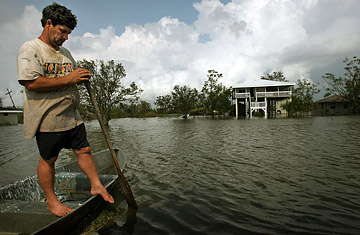
Kim Guy stands on a boat in front of his home in the floodwaters from Hurricane Gustav September 2, 2008 in Chauvin, Louisiana. Chauvin is located just north of Cocodrie, where Hurricane Gustav made landfall.
The day after Hurricane Gustav battered this coastal region, along Highway 57 from Houma, cars dodged downed power lines, felled oak trees, and an occasional dead turtle. "You LOOT, we SHOOT," read one wooden sign that'd been attached to one home's front door. Du Lac, not far from Cocodrie where Gustav made landfall, is so sparse it doesn't feel like much of a town. It's a set of trailers and single-level homes, often built on stilts, some rising some 10, 20, even 30 feet into the air above marshes.
Washington bureaucrats often act as if they alone know how best to protect low-lying areas like Du Lac from flooding. Truth is, the folks who've spent their entire lives on the water have their own insights. Take Chris DeJean, 24. On Tuesday afternoon, DeJean was clearing debris from his shrimping boat, which floated in the bayou directly behind the home he shares with his mother. Like many people here, DeJean's roots in Du Lac run deep. His mother was born 40 years ago in the house right across the street. His grandmother was born there, too.
DeJean rode out the storm at his house. He took several seconds to consider how to protect bayou communities like his — and whether a kind of Great Wall of Louisiana would be built. He says: "It probably could help. But you need floodgates on everything. The only way it'd work is for everything to be connected. You couldn't have pieces [of the levee] here-and-there, you know?" he says, standing outside his one-story white clapboard house.
Then, there's the question about his business as water overwhelms what remains of the land. "As far as shrimping goes," DeJean continues, "there's going to be more shrimp. But you'll have a lot of garbage to deal with. You'll have trees, like in the nets." His 12-hour shifts will be reduced to six or eight mainly "because you spend so much time getting trees out the nets." Given the shortage of fuel, when does he expect to return to work? "You're talking a couple weeks without power, before we can do anything. You'd better have a something picked up [that is, money saved] for a couple weeks."
Just a few miles up the road, Keith Luke, 54, stood atop his boat, Miss Brandy. He built the boat 15 year ago and named it after his daughter, who is now 36 years old. Luke is portly, with a thick beard, and on this afternoon wore a faded red t-shirt with a kind of self-made v-neck. A bit of hair poked out. Despite the warnings about Gustav, Luke holed himself up in Miss Brandy, along with his deckhand, Charlie. "Things was bad," Luke says of Gustav. "We had a lot of wind, but not a lot of water." The water, he estimates, rose about three feet above normal. How would he go about protecting his community? "We need levees — with floodgates that work. This is one bayou that's not protected. There are other bayous they [the federal government] were able to get to, and I'm sure we're going to get our turn. As soon as they get to us."
Many folks in the rest of the country wonder why anyone would want to live in such a flood-prone place. Luke becomes visibly tense at the subject and responds, "It's a way of life," referring to living on the water. "The new buildings are being built on pilings. So you can take the flood. Wind, you just don't know. But everyone's going up," he says, referring to the homes along the bayous perched on stilts. "You just set yourself up for the lick, you know?" The "lick" is a euphemism for heavy flooding.
